The Lord’s Supper
Along with God’s Word preached, the Service for the Lord’s Day at First Presbyterian Church often includes the Word enacted in the Lord’s Supper. We hope this brief guide will answer questions you might have about this sacramental meal and aid your informed and joyful participation.
What is the Lord’s Supper? The Lord’s Supper (also called Communion or the Eucharist) is a sacrament. “A sacrament is a special act of Christian worship which uses visible signs to present God’s grace to us in Jesus Christ.”1
Presbyterians recognize two sacraments instituted by Jesus Christ: baptism and the Lord’s Supper. Almost all Christian denominations also celebrate these sacraments.
What actions are involved? Following Christ’s example, the minister serving at the Lord’s Table takes bread and wine, gives thanks for them, breaks the bread, pours the wine, and gives them to the people. The people then eat and drink.
Why are these actions important? By taking part in these actions, we remember the life, death, and resurrection of Christ, give thanks to God, share God’s love with one another, and look forward to the coming of God’s reign in all its fullness. These are only some of the dimensions of this “mystery of grace.”

What are the Communion elements? Bread common to the culture is used. The “wine” in the Lord’s Supper at First Presbyterian Church is non-alcoholic grape juice.
Who may take part in the Lord’s Supper? The invitation to the Lord’s Supper is extended to all who hunger for the bread of life, regardless of age or denominational affiliation.
What if I don’t feel worthy? Access to the Lord’s Table “is not a right conferred upon the worthy, but a privilege given to the undeserving who come in faith, repentance, and love . . . Even one who has doubts or whose trust is wavering may come to the Table in order to be assured of God’s love and grace in Christ Jesus.”2
What if I feel moved to receive Communion, but am not baptized? The Lord’s Supper and baptism are inseparable. If you feel called by the Holy Spirit to meet Christ in Communion, we believe that you are also being called to baptism. We will not turn anyone away from the Lord’s Table, but we do invite you to speak to the pastor about your baptism as soon as possible.
May children receive Communion? Baptized children who are being nurtured in the Christian faith are also invited to eat and drink, even though their understanding of the Supper will vary according to their maturity.
First Presbyterian Church provides nurture and instruction for children and parents in the meaning of this sacrament. Children’s participation in Communion should take place in the context of their continuing Christian nurture at home and in the church.
How do I participate in this sacrament? After the communion prayers and words of institution, the people are invited to come to the Lord’s Table.
The Choir comes first, followed by those in the upstairs galleries. Then those seated downstairs come, starting from the back of the sanctuary. An usher will indicate when it is your turn.
When you approach the Table, please take your time, and maintain social distance from other worshippers. Please remain masked until the time comes to partake of the elements. You’ll receive a piece of pre-sliced bread from an elder, who will say words like, “The Bread of Heaven, given for you,” or “The Body of Christ, given for you.” As you are given the bread, you may say “Amen,” and eat as you receive.
Next, please move to the elder with the tray of cups. The tray will be offered with words such as “The Cup of Salvation, poured out for you.” We invite you to say “Amen,” take a cup from the tray, and drink while still standing by the tray.
When you are ready, please move to the basket provided nearby, place your empty cup in it, and return to your pew by the same aisle you used when coming to the Table.
Feel free to make eye contact with fellow worshipers as you come and go, just as you would at a common meal.
If children accompany you to the Table, but are not to be served, please indicate this to the elders. Children may hold their arms crossed against their chest to show that they are not eating and drinking.
What happens if I don’t come to the Table? If you are sitting downstairs, the usher will ask if you wish to be served the bread and wine in your pew. (The elements are not served in the pews upstairs, so if you wish to remain seated for communion, please choose a seat on the downstairs level.)
If you do not wish to take part, simply decline. No one should feel pressured to receive Communion.
What else happens as the people eat and drink? Songs are sung by the choir and congregation, music is played, and periods of silence are kept. You are invited to take part in all these forms of communal prayer, and to pray individually.
Why celebrate Communion in the Lord’s Day Service? Worship on the Lord’s Day is, at its heart, a celebration of Christ’s resurrection. In this sense, every Sunday is Easter Sunday.
“Before church governments were devised, before creeds were formalized, even before the first word of the New Testament was written, the Lord’s Supper was firmly fixed at the heart of the Christian faith and life. From the church’s inception, the Lord’s Day and the Lord’s Supper were joined.”3
The Directory for Worship of the Presbyterian Church (U.S.A.) states:
“It is appropriate to celebrate the Lord’s Supper as often as each Lord’s Day.”4
Including Communion in the Service for the Lord’s Day is faithful to Christ’s command in Scripture, the example of the early church, and the theological affirmations of the Reformed tradition. Communion expresses the unity of Word and Sacrament, a fundamental emphasis of Presbyterians. Linked with the preaching of the Word, both sacraments “seal” God’s promises proclaimed in the gospel.
Communion demonstrates the unity which is God’s gift to the church. When we eat and drink at the Lord’s invitation, we obey his command and respond to his prayer that the church “may be one” (Jn. 17:11). As a sign to others, the Supper is an “enacted parable” of God’s reconciliation of the world through Christ.
To use an old Reformed term, Communion is also a “converting ordinance.” Through Word and Sacrament together, the Holy Spirit communicates the gospel, brings us closer to God and one another, disciplines us, and empowers us for faithful living.
By employing all the senses, the Lord’s Supper provides means for us to worship with our bodies as well as our intellect. To eat and drink at Christ’s invitation is to dedicate ourselves to Christ and to open ourselves to transformation.
The Lord’s Supper is both a memorial meal and a feast of thanksgiving. In the Supper we meet the risen Christ, commune with saints both past and present, and share a foretaste of the messianic banquet. Sealed in God’s covenant of grace through eating and drinking at the Lord’s Table, we are nourished to be Christ’s body in the world. The Lord’s Supper is indeed “the joyful feast of the people of God.”
You are invited to take part in the Lord’s Supper, responding to the Spirit’s call, sharing the risen Christ, and receiving the grace offered freely by the Triune God who has given us this sacrament.
References
1 Belonging to God: A First Catechism (Presbyterian Church (U.S.A.)).
2 Book of Order (Presbyterian Church (U.S.A.)).
3 Book of Common Worship (Presbyterian Church (U.S.A.)).
4 Book of Order.

